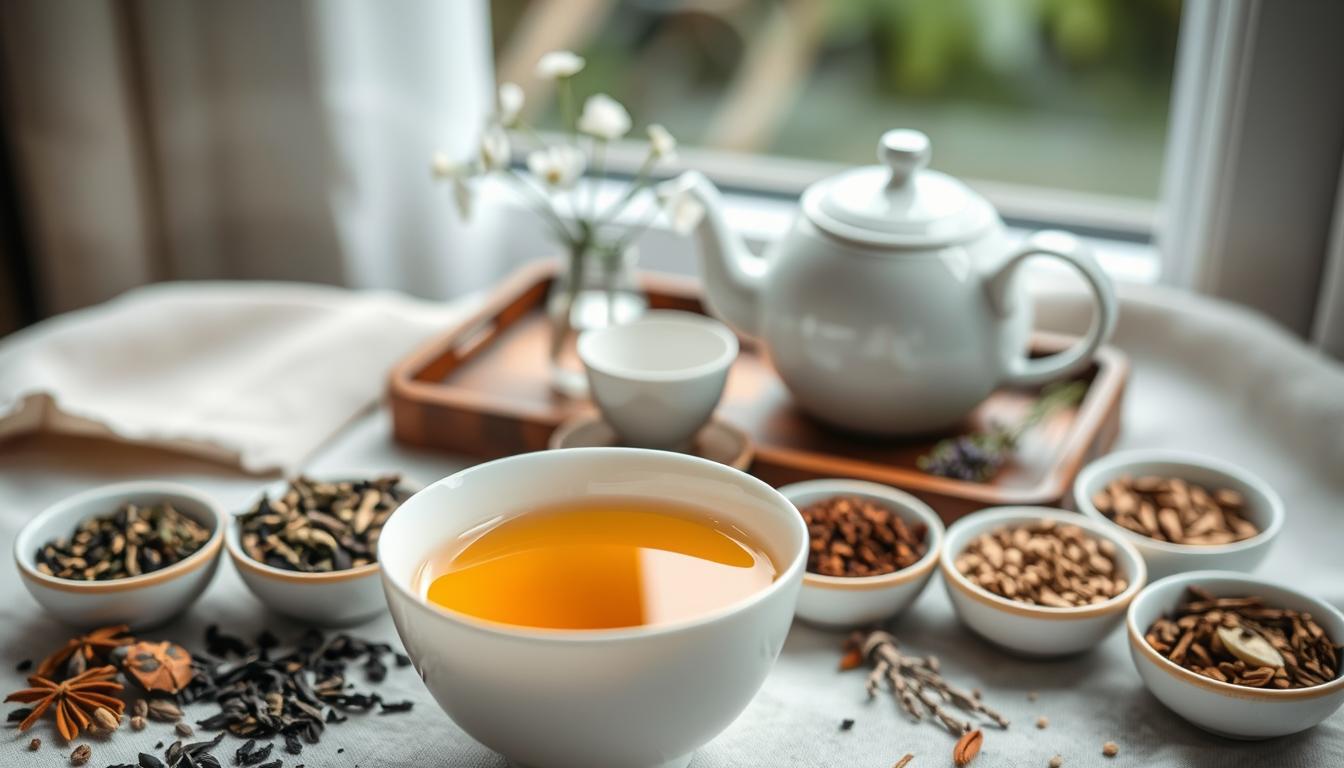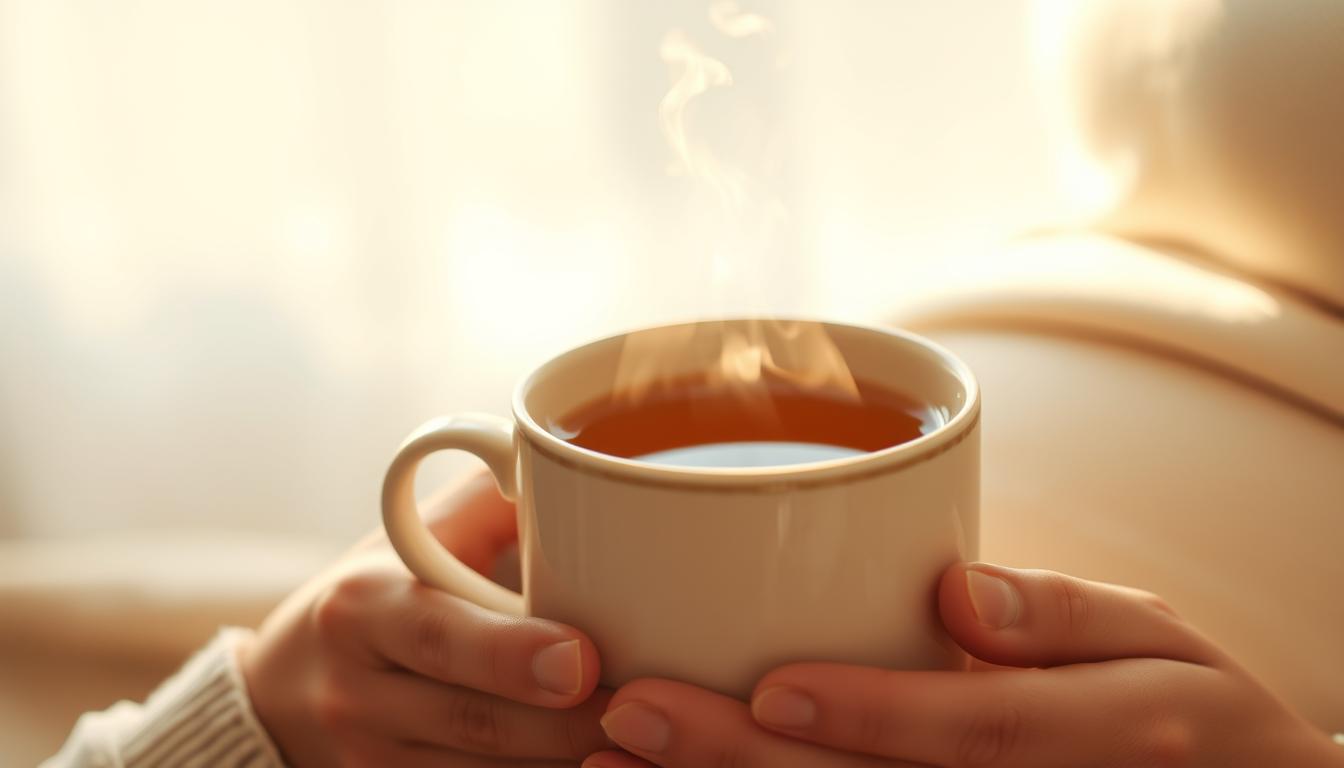Did you know that caffeine intake over 200 mg per day can increase the risk of complications for a pregnant woman? With tea being a beloved beverage worldwide, many women wonder about its safety during this crucial time. While a warm cup can feel comforting, understanding its effects is essential.
Earl Grey, a popular choice, contains caffeine, which raises questions about its suitability. However, not all teas are created equal. Some, like herbal tea, may offer benefits, while others could pose risks. This article explores the nuances of tea consumption during pregnancy, focusing on caffeine levels and herbal alternatives.
From black tea to peppermint tea, we’ll break down what’s safe and what to avoid. Recent research and expert guidelines will help you make informed choices for you and your baby.
Key Takeaways
- Moderation is key when consuming caffeinated teas during pregnancy.
- Herbal teas like raspberry leaf may offer benefits but require caution.
- High caffeine intake can increase the risk of miscarriage or low birth weight.
- Always consult your healthcare provider before trying new teas.
- Natural doesn’t always mean safe, especially during pregnancy.
Understanding Tea and Pregnancy: An Overview
Tea plays a unique role in the lives of many, especially for those expecting. Whether it’s a comforting cup in the morning or a soothing blend at night, tea is a staple in many routines. However, not all teas are created equal. Understanding the differences between caffeinated and herbal options is key to making informed choices.

Caffeinated Versus Herbal Tea Insights
Caffeinated teas, like black tea and green tea, contain natural stimulants that can affect the body. While moderate caffeine intake is generally considered safe, excessive amounts may pose risks. For example, caffeine can cross the placenta, potentially impacting the baby’s development.
On the other hand, herbal teas are made from plants, herbs, and flowers. Popular choices like peppermint tea or raspberry leaf tea are often caffeine-free. However, not all herbal blends are safe. Some herbs may have strong effects on the body, so it’s essential to research or consult a provider before trying new options.
The Role of Tea in a Pregnant Woman’s Routine
Tea can be a versatile addition to a daily routine. Many women turn to it for hydration, especially when plain water feels unappealing. Certain blends, like ginger tea, may help soothe nausea, a common symptom in the first trimester.
Moderation is key. A cup or two of caffeinated tea per day is usually fine, but it’s best to monitor overall caffeine intake. Herbal teas can be a great alternative, but always check the ingredients. As one study notes, “Natural doesn’t always mean safe, especially during this time.”
Recent research highlights the benefits of antioxidants and polyphenols found in some teas. These compounds can support overall health, but they’re not a substitute for a balanced diet. Always prioritize safety and consult your healthcare provider for personalized advice.
is earl grey tea safe during pregnancy
Many women enjoy a warm cup of tea, but is it a good choice for expectant mothers? Caffeinated blends, like Earl Grey, are popular but raise questions about their effects on health. Understanding the balance between benefits and risks is crucial for making informed decisions.

Evaluating the Benefits and Risks
Earl Grey contains caffeine, which can cross the placenta and affect the baby. Studies suggest that excessive intake may lead to complications like low birth weight or miscarriage. However, moderate consumption, typically under 200 mg per day, is generally considered safe.
On the positive side, this blend offers antioxidants that support overall health. For many women, it’s also a soothing drink during stressful periods. The key is to weigh these benefits against potential risks.
Individual sensitivity to caffeine varies. Some may feel jittery after just one cup, while others tolerate it well. Genetics play a role, so it’s important to listen to your body and adjust accordingly.
Guidelines for Moderate Consumption
To enjoy tea safely, follow these tips:
- Limit intake to one or two cups per day.
- Opt for shorter steep times to reduce caffeine levels.
- Consider cold brew methods, which often result in lower caffeine content.
- Pair caffeinated teas with caffeine-free options like herbal blends.
Always consult your healthcare provider before making changes to your routine. They can offer personalized advice based on your unique needs and health history.
Research shows that moderation is key. By staying within recommended limits, you can enjoy your favorite drink while prioritizing the well-being of both you and your baby.
Potential Risks from Tea Ingredients During Pregnancy
When expecting, it’s important to understand the potential risks tied to tea ingredients. While many blends are enjoyed daily, some components may not be suitable for this sensitive time. Caffeine and certain herbs can have effects that require careful consideration.
Caffeine Content and Its Effects
Caffeine, found in many teas, can cross the placenta and affect a developing baby. Even moderate levels may pose risks. Studies link high caffeine intake to complications like low birth weight or miscarriage. “It’s crucial to monitor caffeine consumption,” notes one study. Staying under 200 mg per day is generally advised.
Shorter steep times or cold brew methods can reduce caffeine levels. Pairing caffeinated teas with caffeine-free options like herbal tea is another smart approach. Always consult your healthcare provider for personalized guidance.
Herbal Components to Approach with Caution
Not all herbal teas are safe. Ingredients like chamomile, fennel, or pennyroyal may stimulate uterine contractions or menstrual bleeding. Raspberry leaf tea, often praised for its benefits, should be used cautiously. Research on its effects remains mixed.
Teas from reputable sources are essential to avoid contamination with heavy metals. “Natural doesn’t always mean safe,” reminds one expert. Always check labels and consult your provider before trying new blends.
By understanding these risks, you can make informed choices. Prioritize safety and moderation to support both your health and your baby’s well-being.
Research-Backed Guidance and Expert Recommendations
Recent studies shed light on how tea affects maternal and fetal health. Researchers have explored the relationship between caffeine intake and risks like miscarriage or low birth weight. Findings suggest that staying under 200 mg of caffeine per day is generally safe for most women.
Experts like Amelia Hirota and Laurie Green emphasize the importance of moderation. “While some teas can be beneficial, others may pose risks,” notes Hirota. Providers often recommend avoiding certain herbs and sticking to well-studied options like rooibos or ginger blends.
Findings from Recent Studies
Studies highlight the potential impact of tea on folic acid absorption. High caffeine levels may interfere with this essential nutrient, which is crucial for fetal development. Research also shows that herbal teas like raspberry leaf may offer benefits but require caution due to limited data.
One study found that women who consumed more than 300 mg of caffeine daily had a higher risk of complications. However, moderate intake, typically one to two cups per day, showed no significant adverse effects. These findings underscore the need for careful monitoring.
Provider Advice on Choosing Tea Safely
Healthcare providers stress the importance of personalized advice. “Not all herbal teas are created equal,” says Green. Ingredients like chamomile or fennel may stimulate uterine contractions, making them unsuitable for some women.
Providers often recommend sticking to caffeine-free options like peppermint or ginger tea. These blends are generally considered safe when consumed in moderation. Always check labels and consult your provider before trying new teas.
By following research-backed guidance and expert recommendations, you can make informed choices. Prioritize safety and moderation to support both your health and your baby’s well-being.
Conclusion
Making informed choices about beverages can help support a healthy journey for both mother and baby. While many caffeinated options are generally fine in moderation, it’s essential to stay cautious with herbal varieties. Some blends may carry risks, so always check ingredients and consult your healthcare provider.
Research highlights the importance of limiting caffeine intake to under 200 mg per day. This helps reduce potential risks like low birth weight. Herbal options, such as ginger or peppermint, can be great alternatives but require careful consideration.
Individual responses vary, so listen to your body and seek personalized advice. By following expert guidelines and staying informed, you can enjoy your favorite drink while prioritizing your health and your baby’s well-being.
Empower yourself with knowledge and make choices that feel right for you. A balanced approach ensures a safe and enjoyable experience during this special time.

